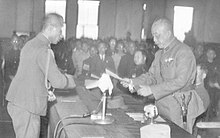Rikichi Andō
Rikichi Andō | |
|---|---|
 Japanese General Andō Rikichi in 1940 | |
| Governor General of Taiwan | |
| In office 30 December 1944 – 25 October 1945 | |
| Monarch | Shōwa |
| Preceded by | Kiyoshi Hasegawa |
| Succeeded by | Chen Yi (as Chief Executive of Taiwan Province) |
| Personal details | |
| Born | 3 April 1884 Tenth Area Army |
| Battles/wars | Second Sino-Japanese War |
Rikichi Andō (安藤 利吉, Andō Rikichi, 3 April 1884 – 19 April 1946) was a general in the Imperial Japanese Army and 19th and final Japanese Governor-General of Taiwan from 30 December 1944 to October 1945.
Biography
Early career
Andō was a native of
From 1931-1932, Andō returned to the General Staff, where he was Chief of Military Administration Section, Military Affairs Bureau. He was appointed military attaché to the United Kingdom from 1932-1934. After his return to Japan, he became Commandant of the Toyoma Army Infantry School, and subsequently commander of the 5th Independent Garrison Unit. From 1937-1938, he was Deputy Inspector-General of Military Training.
The man who started the Pacific War
With the outbreak of the
In the midst of diplomatic negotiations between Japan and its ally,
Taiwan

In the fall of 1941, Andō was recalled to service, promoted to full general, and given command of the
Arrested by Chinese authorities and charged with
See also
References
Books
- Fuller, Richard (1992). Shokan: Hirohito's Samurai. London: Arms and Armor. ISBN 1-85409-151-4.
- Shih Shan, Henry Tsai (2005). Lee Teng-hui and Taiwan's Quest for Identity. Palgrave Macmillan. ISBN 1-4039-7056-4.
Notes
External links
- Ammentorp, Steep. "Ando, Rikichi". The Generals of World War II.
- Budge, Kent. "Ando, Rikichi". The Pacific War Online Encyclopedia.
- Chen, Peter. "Ando, Rikichi". World War II Database.
- Wendel, Marcus. "Axis History Factbook". Governor-Generals of Taiwan.
